 Expert perspectives on the expectations church leaders face today, common pitfalls and risks, and how to rise to the challenge
Expert perspectives on the expectations church leaders face today, common pitfalls and risks, and how to rise to the challenge
Overall, are pastors adequately trained and prepared with regards to counseling their congregations?
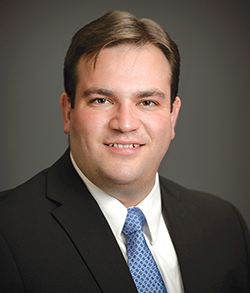
Director
Villanova University Center for Church Management
Jim Gallo: In general, we find that Catholic seminaries do a good job at training men to be priests, including the development of their spirituality and in pastoral counseling. However, we find that many Catholic pastors struggle to find time to devote to their jobs as counselors and teachers as they become mired in the management of temporal issues within the parish.
Although most pastors are very comfortable with their roles as counselors and teachers, it’s in temporal management where they tend to be least prepared. We believe by educating pastors in the temporal management of the church, as well as by hiring qualified lay people to assume some of the management responsibility in the church, more time can be dedicated to counseling for busy pastors, and the skills they learned in seminary can be honed and developed to meet the needs of today’s congregants.
Ian F. Jones: While most clergy receive some instruction in counseling, they’re desiring more training — particularly on family problems.
The good news is, after working with pastors and counselors, we’ve seen how an increase in training builds confidence in pastors’ ability to counsel effectively.
However, educational trends are moving in the opposite direction. While more and more we see pastors benefiting from additional training, most MDiv programs are getting shorter — with almost 45 percent not even requiring a counseling class.
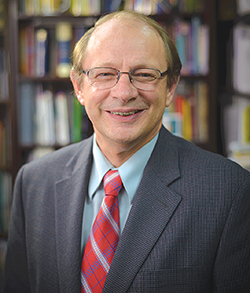
Professor of Counseling, Chair of the Division of Church and Community Ministries
New Orleans Baptist Theological Seminary
In short, most pastors aren’t adequately trained to deal with problems found in their congregations. While there are liabilities and risks associated with counseling, the reality is that every pastor is a counselor, whether voluntary and prepared or not. The lack of training increases the risk of mistakes.
As an example, pastors have been shown to have engaged in inappropriate sexual relations in counseling far more so than other trained professionals, such as licensed counselors, social workers and psychologists.
One reason is that boundaries and ethical codes are taught and emphasized heavily in the programs of these other professionals, while pastors who lack adequate counselor training appear to assume that they won’t fall prey to such transgressions.
Jim Miller: If, as a pastor, I’m expected to provide long-term, therapy-type counseling, then the three counseling classes I had in seminary were probably not sufficient in preparing me for that kind of ministry.
But most instances of pastoral counseling have more discipleship elements to them, which I think many pastors are capable of handling.
Crisis management and recognizing when to refer are common shortfalls in the area of counseling. Much of that has to do with confidence, that a pastor feels capable of offering counsel that will make a difference.
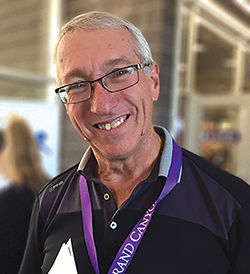
Corporate Chaplain
Grand Canyon University
In terms of liabilities and risks a pastor should be aware of related to counseling, one is the idea of being a counselor who is ‘above reproach.’ We need to take measures to make certain that we’re maintaining integrity as we counsel, that we leave no opportunity for accusations or for improper relationships to develop.
Another risk is self-care. Because we tend to be caring types in the pastorate, the ability to not carry the burdens of others in a detrimental way is difficult for us. We need to find the outlets for our souls to be refreshed and life spoken into us.
Nathan Terlisner: No, most pastors aren’t adequately trained and prepared when it comes to counseling.
Many larger churches deal with this issue by having trained Christian counselors, or a ‘care pastor,’ who can do counseling for the congregation.
Smaller churches don’t have the budget for that, so the pastor will typically provide pastoral counseling.
The reality is most theology programs don’t provide significant materials for pastors to counsel. Inner healing ministry and listening to God for the sake of helping others — and speaking truth into their life — are two skills I would recommend honing.
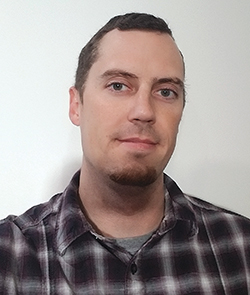
University Counselor,
College of Theology
Grand Canyon University
Have full-time church leaders shown increased interest in counseling training and education in recent years?
Terlisner: Yes. I think pastors typically try to use the Bible to help others with their problems, but many are finding there are issues which people face that don’t have a specific scripture to be applied. Therefore, they feel like they want more training on biblical counseling.
My experience has been that most don’t know what they’re missing; they just know they want to know more to help others.
People are facing stress, addictions and life demands like never before. Many church members don’t know how to handle these issues and are turning to pastors for help.
Gallo: At the Center for Church Management, we’ve found an increasing number of lay people interested in helping manage the day-to-day temporal matters of parishes and dioceses in order to free up more time for pastors to attend to the spiritual needs of their communities.
By helping lay people assume these positions of leadership within the church, busy priests and pastors are able to invest in counseling training to meet the needs of their people and fulfill their mission as the spiritual leaders of the church.
Jones: Absolutely, they’re showing increased interest in counseling training. And that’s particularly due to the realization that problems are endemic to our churches — suicide; drugs; sexuality and pornography; teenage issues (anorexia, bulimia and cutting); and marital problems and divorce.
As such, we’re seeing a need for counseling training in areas of trauma and abuse, marriage and family problems, and sexuality-related problems and concerns.
How have your seminary’s educational offerings evolved to help meet church leaders’ emerging counseling training needs?
Terlisner: Recently, we released a Graduate-level Christian Counseling Certificate.
Gallo: For more than a decade, the Center for Church Management at Villanova has offered both a Master of Science in Church Management degree, as well as a Certificate in Church Management. These programs are geared to both help busy pastors better understand the strategic, temporal and management issues of the church, as well as help lay people assume leadership positions in the management of the church.
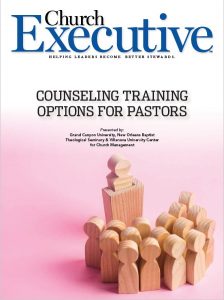
Since our programs are offered online, our students come from both Catholic and non-Catholic Christian traditions, and touch every continent for a truly global perspective.
It’s our hope that by having qualified people working in the management of the church, busy pastors may have more time to counsel their congregations spiritually, educationally and emotionally.
Jones: We have expanded our delivery systems, offering more flexible hours to take classes, hybrid course options (combining in-class with online), synchronous and asynchronous online courses, as well as workshops.
We’ve also found it helpful to offer both a licensure and a non-licensure track of the MDiv (with counseling specialization).
In addition, we offer an M.A. in counseling with two specializations — one in clinical mental health and another in marriage and family. Both of these are in line with becoming a licensed professional counselor.
We also have a 17-hour graduate certificate in counseling ministry.
For those pastors and counselors looking for professional hours, or to learn more outside of a degree program, we host the Annual Christian Counseling Conference at our seminary each year, which provides workshops on counseling and counseling-related issues.
How important is the online study component in accommodating full-time church leaders interested in obtaining counseling training (while maintaining their ministry at home)?
Jones: The additional options of flexible course times — where students can choose to attend the class by synchronous video or review the class online at another time during the week (asynchronous video) — provide opportunities for potential students that were simply not available in the past.
Miller: You can see how an online option would benefit many of us who are in full-time ministry, especially for those who have no local seminaries in their communities. Online expands the possibilities of more widespread training of pastors, particularly in rural or small-town America.
Gallo: Online education is crucial to our program at Villanova. By offering this type of education online, we’re able to offer church management education to students on every continent from the convenience of their homes. With today’s video technology, anyone with a mobile phone can participate and learn.
Additionally, it allows busy pastors, priests and lay church workers to take courses at their convenience without interrupting their work schedules.
What would you say to a pastor who still thinks counseling training is out of reach?
Gallo: Education through the Villanova Center for Church Management is most certainly not ‘out of reach.’ By offering our programs in an online format, anyone can take the program from wherever they are.
Additionally, we offer steep tuition discounts to both clergy and lay people who work in the church or even hope to work for the church. We would invite anyone who feels an education in church management is beyond their reach to have a conversation with us!
Jones: This person is of special interest to us.
From our annual conference, certificates and full degrees, to in-class and remote options, we want to remove every barrier we can to helping the right people get the right training.
For anyone still on the fence, I encourage them to investigate our program at NOBTS and see if any of the multiple options we offer would meet his or her needs.
Miller: We all know that the world has become smaller with the technical innovations of our day. This includes the opportunities to develop skills we feel are necessary for our ministries. This kind of continuing education is now at our fingertips.
Terlisner: There are many great online resources available to help better equip you in the ministry.
— Reporting by RaeAnn Slaybaugh


